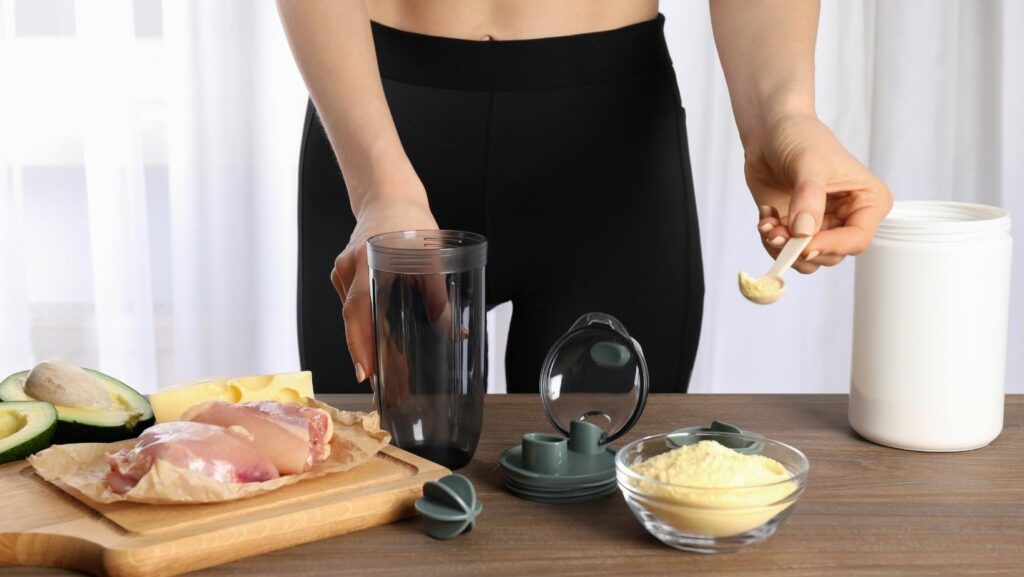Sports Nutrition Manufacturing
- Importance of Sports Nutrition: Sports nutrition manufacturing is essential for enhancing athlete performance and recovery through dietary supplements designed for various training needs.
- Key Ingredients: Effective sports nutrition products often contain proteins, amino acids, carbohydrates, electrolytes, vitamins, and minerals, which are critical for muscle repair, energy production, and overall health.
- Quality Control: Stringent quality control measures ensure the safety and efficacy of products, including rigorous testing of raw materials and final products to comply with FDA and NSF International standards.
- Regulatory Compliance: Adhering to regulations set by the FDA guarantees that sports nutrition products are safe and accurately labeled, providing transparency about ingredient sourcing and health claims.
- Market Trends: The industry is experiencing a shift towards clean label products that emphasize natural and organic ingredients, along with innovative formulations tailored to specific athlete needs.
- Sustainability Initiatives: Manufacturers are increasingly adopting sustainable practices, focusing on eco-friendly sourcing, recyclable packaging, and reducing environmental impact, which fosters consumer trust and loyalty.
In the ever-evolving world of athletics, sports nutrition manufacturing plays a crucial role in enhancing performance and recovery. Athletes are increasingly turning to specialized supplements to optimize their training regimens and achieve their goals. This growing demand has led to a surge in the production of innovative products tailored to meet the diverse needs of sports enthusiasts.
Manufacturers are now focusing on quality ingredients and cutting-edge formulations to ensure that athletes get the most out of their nutrition. With a keen emphasis on safety and efficacy, the industry is not just about creating supplements; it’s about fostering a culture of health and performance. Understanding the intricacies of sports nutrition manufacturing is essential for anyone looking to navigate this dynamic market and harness its potential.
Overview of Sports Nutrition Manufacturing
Sports nutrition manufacturing involves the systematic production of dietary supplements tailored for athletes and fitness enthusiasts. Key components include protein powders, energy bars, hydration solutions, and performance-enhancing supplements. Each product aims to improve athletic performance, aid recovery, and support overall health.
Manufacturers focus on sourcing high-quality ingredients, such as whey protein, BCAAs, vitamins, and minerals. These components undergo rigorous testing to ensure safety and efficacy. Advanced formulations consider the specific needs of various sports and individual athletes, accommodating factors like endurance, strength training, and post-workout recovery. 
The production process adheres to stringent regulations set by authorities like the FDA and NSF International. Quality control measures throughout manufacturing guarantee products meet safety standards and label claims. Additionally, many manufacturers invest in research and development to innovate and expand their product lines, reflecting evolving trends in sports nutrition.
Market trends reveal a significant growth in consumer demand for clean label products. Athletes increasingly seek transparency in ingredient sourcing, favoring natural and organic components. Manufacturers respond by offering products free from artificial additives, allergens, and fillers.
E-commerce platforms play a vital role in sports nutrition manufacturing, enabling brands to reach a wider audience. Online marketing strategies and social media engagement attract consumers seeking tailored solutions for their fitness journeys, creating more opportunities for brand loyalty and product diversification.
Key Ingredients in Sports Nutrition Products
Sports nutrition products contain vital ingredients that enhance performance, recovery, and overall athlete well-being. Understanding these ingredients helps consumers make informed decisions.
Proteins and Amino Acids
Proteins serve as the foundation for muscle repair and growth. Common sources include whey protein, casein, and plant-based proteins like pea and rice. Amino acids, particularly branched-chain amino acids (BCAAs), play a critical role in muscle recovery and energy production during workouts. They help reduce muscle soreness and fatigue. Many products also incorporate essential amino acids (EAAs) to support various physiological functions.
Carbohydrates and Electrolytes
Carbohydrates provide the primary energy source for exercise. Complex carbohydrates, such as oats and sweet potatoes, release energy steadily, while simple carbohydrates, like glucose and fructose, deliver quick energy boosts. Electrolytes, including sodium, potassium, and magnesium, maintain hydration and regulate muscle function. Proper replenishment of electrolytes enhances endurance and prevents cramping during prolonged physical activities.
Vitamins and Minerals
Vitamins and minerals support numerous bodily functions that are crucial for athletic performance. B-vitamins, such as B6 and B12, assist in energy metabolism. Vitamin C and vitamin E act as antioxidants, reducing oxidative stress from intense training. Minerals like calcium and iron are essential for bone health and oxygen transport, respectively. Incorporating these micronutrients in sports nutrition products ensures optimal physiological function for athletes.
Manufacturing Processes in Sports Nutrition
Sports nutrition manufacturing involves several critical processes to ensure the production of high-quality dietary supplements. Each step, from sourcing raw materials to packaging and distribution, plays a vital role in delivering effective products to athletes.
Sourcing Raw Materials
Sourcing raw materials is a foundational aspect of sports nutrition manufacturing. Manufacturers select high-quality ingredients, such as whey protein, BCAAs, and natural flavorings. They often prioritize suppliers who comply with industry standards and regulations to ensure the purity and efficacy of the ingredients. Additionally, manufacturers conduct thorough evaluations of ingredient specifications, including verification of sourcing practices and testing for contaminants.
Quality Control Measures
Quality control measures are integral throughout the manufacturing process. Manufacturers implement stringent testing protocols at various stages, from raw material receipt to final product verification. Each batch undergoes microbiological and chemical testing to ensure safety and compliance with established standards, such as those set by the FDA and NSF International. Documentation of these tests helps maintain transparency and accountability, ensuring that all products meet safety and quality benchmarks.
Packaging and Distribution
Packaging and distribution are crucial for maintaining product integrity and freshness. Manufacturers choose materials that protect against moisture and light exposure, which can degrade quality. Labels include detailed nutritional information, ingredient sourcing, and storage instructions to facilitate consumer understanding. Distribution channels, including e-commerce platforms, allow for efficient product delivery, ensuring athletes can easily access the supplements they rely on for enhanced performance and recovery.
Regulatory Considerations
Regulatory oversight plays a critical role in sports nutrition manufacturing. Adhering to regulations ensures product safety and efficacy, safeguarding consumer health.
FDA Regulations
The FDA oversees dietary supplements, including sports nutrition products, under the Dietary Supplement Health and Education Act (DSHEA) of 1994. Manufacturers must ensure their products are safe and that any claims made about health benefits are substantiated. The FDA does not pre-approve dietary supplements before they enter the market, placing the onus on manufacturers to adhere to Good Manufacturing Practices (GMP). Compliance with GMP involves rigorous quality control, including testing raw materials and finished products to ensure they meet safety standards and contain declared ingredients. Documentation and reporting of adverse events are mandatory, allowing the FDA to monitor product safety post-market.
Labeling Requirements
Labeling requirements for sports nutrition products are stringent to provide transparency to consumers. Each product label must include essential information such as serving size, ingredient list, and a “”Supplement Facts”” panel detailing the nutritional content per serving. Health claims, if made, must comply with FDA guidelines, ensuring they are accurate and not misleading. Manufacturers must disclose allergens, if present, and adhere to specific regulations concerning the use of various terms, such as “”natural”” or “”organic.”” This clear labeling helps athletes and consumers make informed choices about the products they select for their training and performance needs.
Trends in Sports Nutrition Manufacturing
Trends in sports nutrition manufacturing reflect ongoing advancements and consumer demands within the industry. Recent shifts indicate a strong focus on product innovation and sustainability.
Innovations in Formulation
 Innovations in formulation drive the growth of sports nutrition products. Manufacturers are integrating cutting-edge technologies into product development, such as microencapsulation, to enhance ingredient stability and bioavailability. Specific examples include plant-based proteins and adaptogens, which are gaining popularity for their health benefits. Enhanced formulations prioritize specific athlete needs, including recovery and energy replenishment. The use of data analytics also plays a critical role, allowing manufacturers to identify consumer preferences and optimize product offerings. As customization becomes essential, tailored supplements designed for individual dietary requirements are emerging as the norm.
Innovations in formulation drive the growth of sports nutrition products. Manufacturers are integrating cutting-edge technologies into product development, such as microencapsulation, to enhance ingredient stability and bioavailability. Specific examples include plant-based proteins and adaptogens, which are gaining popularity for their health benefits. Enhanced formulations prioritize specific athlete needs, including recovery and energy replenishment. The use of data analytics also plays a critical role, allowing manufacturers to identify consumer preferences and optimize product offerings. As customization becomes essential, tailored supplements designed for individual dietary requirements are emerging as the norm.
Sustainable Practices
Sustainable practices influence modern sports nutrition manufacturing. Manufacturers focus on sourcing ingredients from environmentally responsible suppliers, addressing the growing demand for eco-friendly products. Noteworthy efforts include reducing packaging waste through recyclable materials and minimalistic design. Many companies adopt sustainable farming practices, ensuring that key ingredients like whey protein and plant-based sources are cultivated without harmful chemicals. In addition, initiatives for carbon footprint reduction enhance corporate responsibility in the industry. Transparency in sustainability efforts builds consumer trust and loyalty, promoting a healthier market for both athletes and the environment.
Performance and Recovery
Sports nutrition manufacturing is crucial for athletes striving to enhance their performance and recovery. As the demand for high-quality supplements grows manufacturers are stepping up to meet these needs with innovative products and transparent practices. The focus on clean labels and natural ingredients reflects a shift toward health-conscious choices among consumers.
With a commitment to safety and efficacy manufacturers are not just following regulations but setting standards that promote athlete well-being. As the industry evolves staying informed about these trends can empower athletes and fitness enthusiasts to make educated decisions about their nutrition. This knowledge ultimately supports their journey toward optimal performance and health.

